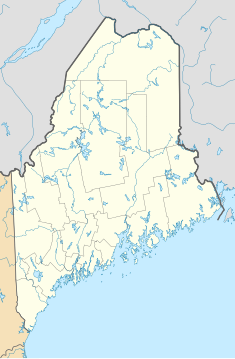The Old City Hall of Portland, Maine, was located in what was then known as Market Square or Haymarket Square (Monument Square today) between 1833 and 1888, when it was demolished. In 1862, it was replaced by an earlier version of the City Hall located today on Congress Street, a short distance northeast of the original location.
| Old City Hall | |
|---|---|
 | |
| Location | Portland, Maine |
| Coordinates | 43°39′27″N 70°15′32″W / 43.65738°N 70.25891°W |
| Built | 1833 |
| Demolished | 1888 |
History
editThe Town of Portland built its Market House in Market (or Haymarket) Square 1825.[1][2][3] The first floor in the building's early years housed stalls used by farmers to sell agricultural products.[1] Also known as Military Hall,[1] the building's simple gable appearance was modified in 1833, to plans made the previous year by Charles Quincy Clapp. Clapp updated the building to the Greek Revival style by removing the cupola from the roof and adding a portico to the front.[2] The cupola was reinstalled on the Universalist school house (now Alumni Hall on the University of New England campus)[4] in Portland's Deering neighborhood.[5]
The new building was the site of the 1855 Portland Rum Riot, which involved mayor Neal Dow and led to one death.[1] It was replaced by a new city hall in 1862 on Congress Street at the head of Exchange Street.[6] The old city hall was demolished in 1888 and replaced by the Soldiers and Sailors Monument, at which time Market Square was renamed Monument Square.[7]
Between 1866 and 1868, the old city hall building was brought into use as such again, after the first iteration of the Congress Street building burned in the fire of 1866.[8]
The United States Hotel, built in 1803, stood behind both iterations of the building.[9][10][11]
Gallery
edit-
A sketch by Charles Quincy Goodhue (1902) of Market House (c. 1830), which was modified to become the first city hall
-
The cupola from Market House, pictured in 2024 on Alumni Hall on the University of New England's Portland campus
-
Old City Hall, pictured in 1886, two years before its demolition
References
edit- ^ a b c d City of Portland 1940, p. 214.
- ^ a b Greater Portland Landmarks 1986, p. 124.
- ^ Moon, John (2009). Portland. Arcadia Publishing. p. 11. ISBN 978-0-7385-6517-0.
- ^ "University of New England celebrates reopening of renovated 182-year-old iconic Alumni Hall on Portland Campus". www.une.edu. 2016-06-13. Retrieved 2024-03-11.
- ^ "Hay Market Square, Portland, 1830". Maine Memory Network. Retrieved 2024-03-11.
- ^ City of Portland 1940, p. 230.
- ^ City of Portland 1940, p. 215.
- ^ Ledman, Paul J. (2016). Walking Through History: Portland, Maine on Foot. Next Steps Publishing. p. 5. ISBN 978-0-9728587-1-7.
- ^ "Edwards and Walker, 1941". Businesses & Buildings - Portland Press Herald Still Film Negatives. 1941-06-29.
- ^ "United States Hotel, Potland, ME". Stereoview Photographs. 2013-08-21.
- ^ "From the archives: Portland from the past". Press Herald. 2015-11-15. Retrieved 2024-03-10.
Sources
edit- Barnes, Albert F. (1984). Greater Portland Celebration 350. Portland, Maine: Guy Gannett Publishing Co. ISBN 9780930096588.
- City of Portland (1940). Portland City Guide. Portland, Maine: The Forest City Printing Company.
- Eisenberg, Christiane (2007). "'German Gymnastics' in Britain, or the Failure of Culture Transfer". In Manz, Stefan; Beerbühl, Margrit Schulte; Davis, John R. (eds.). Migration and Transfer from Germany to Britain, 1660–1914. Munich, Germany: K.G. Saur. pp. 131–146. ISBN 9783598230028.
- Greater Portland Landmarks (1986). Portland (2nd ed.). Hallowell, Maine: Greater Portland Landmarks, Inc. ISBN 9780939761074.
- Leonard, Fred Eugene (1923). A Guide to the History of Physical Education. Philadelphia, Pennsylvania and New York, New York: Lea & Febiger. OCLC 561890463.
- Sears, Donald A. (1978). John Neal. Boston, Massachusetts: Twayne Publishers. ISBN 080-5-7723-08.
